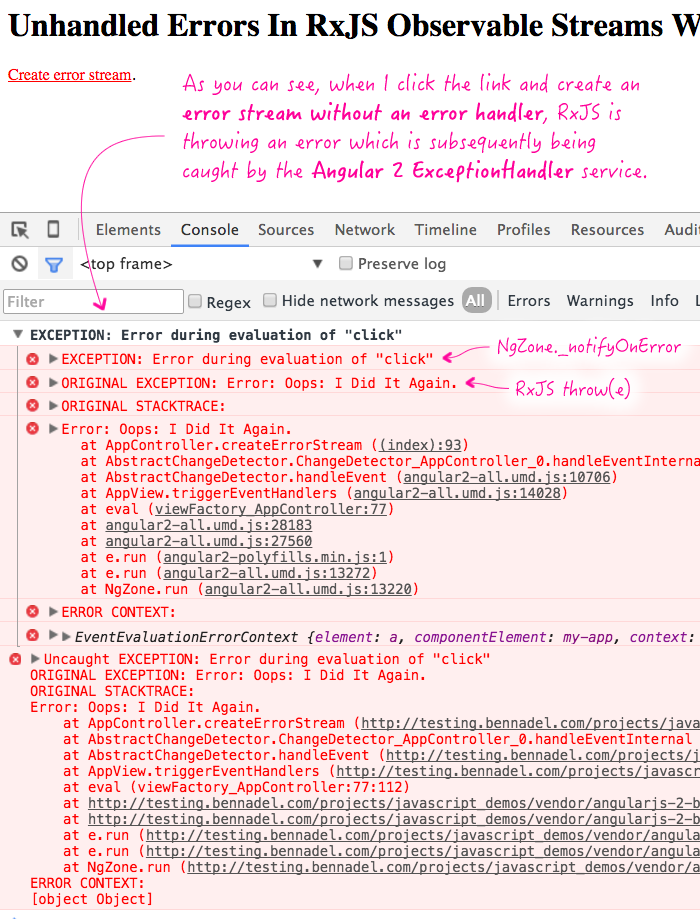Unhandled Errors In RxJS Observable Streams Will Throw Errors In Angular 2 Beta 6
One of the most often cited problems with Promises is that if you don't explicitly handle an error condition in a Promise chain, it's easy to accidentally swallow said error, hiding it from both process and logging. RxJS Observable streams, on the other hand, seem to take a completely different approach. In an RxJS Observable stream, if you don't handle an error condition explicitly, RxJS will handle it implicitly by throwing your error. In Angular 2 Beta 6, the RxJS stream is being managed (so to speak) by the core Zone.js instance which means that these unhandled errors are subsequently caught by the Angular 2 default ExceptionHandler service.
Run this demo in my JavaScript Demos project on GitHub.
To explore this RxJS feature, I put together a tiny little demo that does nothing but create an "error stream" without an error handler (ie, a subscriber that doesn't listen for error events). I also added a few error handling and error conversion functions that you can see in the video:
| <!doctype html> | |
| <html> | |
| <head> | |
| <meta charset="utf-8" /> | |
| <title> | |
| Unhandled Errors In RxJS Observable Streams Will Throw Errors In Angular 2 Beta 6 | |
| </title> | |
| <link rel="stylesheet" type="text/css" href="./demo.css"></link> | |
| </head> | |
| <body> | |
| <h1> | |
| Unhandled Errors In RxJS Observable Streams Will Throw Errors In Angular 2 Beta 6 | |
| </h1> | |
| <my-app> | |
| Loading... | |
| </my-app> | |
| <!-- Load demo scripts. --> | |
| <script type="text/javascript" src="../../vendor/angularjs-2-beta/6/es6-shim.min.js"></script> | |
| <script type="text/javascript" src="../../vendor/angularjs-2-beta/6/Rx.umd.min.js"></script> | |
| <script type="text/javascript" src="../../vendor/angularjs-2-beta/6/angular2-polyfills.min.js"></script> | |
| <script type="text/javascript" src="../../vendor/angularjs-2-beta/6/angular2-all.umd.js"></script> | |
| <!-- AlmondJS - minimal implementation of RequireJS. --> | |
| <script type="text/javascript" src="../../vendor/angularjs-2-beta/6/almond.js"></script> | |
| <script type="text/javascript"> | |
| // Defer bootstrapping until all of the components have been declared. | |
| // -- | |
| // NOTE: Not all components have to be required here since they will be | |
| // implicitly required by other components. | |
| requirejs( | |
| [ /* Using require() for better readability. */ ], | |
| function run() { | |
| var App = require( "App" ); | |
| ng.platform.browser.bootstrap( App ); | |
| } | |
| ); | |
| // --------------------------------------------------------------------------- // | |
| // --------------------------------------------------------------------------- // | |
| // I provide the root App component. | |
| define( | |
| "App", | |
| function registerApp() { | |
| // Configure the App component definition. | |
| ng.core | |
| .Component({ | |
| selector: "my-app", | |
| template: | |
| ` | |
| <p> | |
| <a (click)="createErrorStream()">Create error stream</a>. | |
| </p> | |
| ` | |
| }) | |
| .Class({ | |
| constructor: AppController | |
| }) | |
| ; | |
| return( AppController ); | |
| // I control the App component. | |
| function AppController() { | |
| var vm = this; | |
| // Expose the public methods. | |
| vm.createErrorStream = createErrorStream; | |
| // --- | |
| // PUBLIC METHODS. | |
| // --- | |
| // I create an RxJS Observable error stream. | |
| function createErrorStream() { | |
| Rx.Observable | |
| .throw( new Error( "Oops: I Did It Again." ) ) // I played with your heart, got lost in the game. | |
| .subscribe( | |
| function handleValue( value ) { | |
| console.log( "handleValue:", value ); | |
| } | |
| // NOTE: Uncomment this to handle the upstream error | |
| // and prevent the error from being thrown. | |
| // -- | |
| // , handleError | |
| // Notice that we are not providing a CATCH handler in | |
| // our subscriber configuration. As such, the underlying | |
| // Subscriber class is automatically providing one for | |
| // us, which basically implements: | |
| // -- | |
| // function handleError( e ) { throw( e ); } | |
| ) | |
| ; | |
| // I log errors. | |
| function handleError( error ) { | |
| console.warn( "Caught an error in the stream." ); | |
| console.log( error ); | |
| } | |
| } | |
| } | |
| } | |
| ); | |
| </script> | |
| </body> | |
| </html> |
As you can see, we're using the .throw() operator to start an error stream; but, we're not catching or handling said error. So, when we run this code and click the link, we get the following console output:

As you can see, the unhandled error was rethrown (for lack of a better term) by RxJS. This thrown error was then caught by Zone.js and piped back into the Angular 2 context where it was subsequently logged by the ExceptionHandler service.
Coming from a Promise background, this behavior kind of caught me by surprise. But, I think this is a really nice feature of RxJS Observable streams. It means that unexpected error conditions will never get lost in an Angular 2 application. Well, not if you're using streams.
Want to use code from this post? Check out the license.
Reader Comments